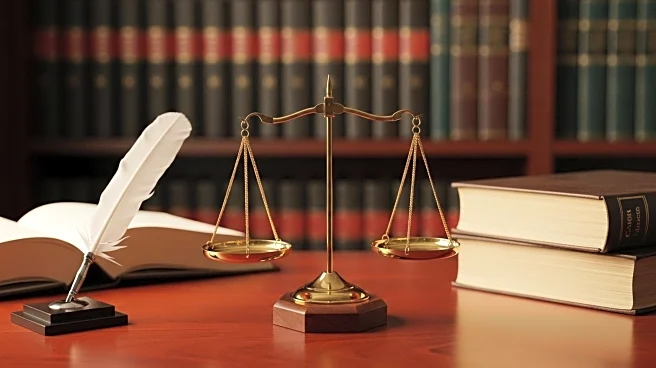What is the story about?
What's Happening?
Justice Anthony Kennedy, a former Supreme Court Justice appointed by President Ronald Reagan, has released a memoir titled 'Life, Law & Liberty: A Memoir,' which is set to be published on October 14. The memoir includes a series of personal anecdotes from his time on the bench, offering insights into his relationships with fellow justices and his experiences during his tenure. Notably, Kennedy recounts a visit from Justice Antonin Scalia, who apologized for the tone of his dissent in the landmark same-sex marriage ruling, Obergefell v. Hodges. The memoir also includes lighter moments, such as a practical joke played by Chief Justice John Roberts on Scalia and an unexpected encounter with Jagdish Chadha, a man whose deportation Kennedy had previously halted.
Why It's Important?
Justice Kennedy's memoir provides a rare glimpse into the personal dynamics and behind-the-scenes interactions within the Supreme Court, an institution often shrouded in secrecy. His anecdotes highlight the human side of the justices, illustrating how personal relationships can influence professional interactions. The memoir may also impact public perception of the Supreme Court by humanizing its members and revealing the camaraderie and conflicts that occur beyond the public eye. For legal scholars and historians, Kennedy's reflections offer valuable insights into the decision-making processes and interpersonal relationships that have shaped significant legal rulings in recent decades.
What's Next?
The release of Kennedy's memoir is likely to spark discussions and analyses among legal experts, historians, and the public. It may prompt further exploration into the personal dynamics of the Supreme Court and how these relationships influence judicial decisions. Additionally, the memoir could inspire other justices to share their own experiences, contributing to a broader understanding of the Court's inner workings. As the memoir becomes available, it may also lead to renewed interest in Kennedy's judicial legacy and the pivotal role he played as a swing vote in many landmark cases.
Beyond the Headlines
Kennedy's memoir underscores the importance of personal relationships in high-stakes environments like the Supreme Court. His reflections on friendship and reconciliation, particularly with Justice Scalia, highlight the potential for personal growth and understanding even amidst ideological differences. This aspect of the memoir may resonate with readers beyond the legal community, offering lessons on the value of maintaining and renewing personal connections. Furthermore, Kennedy's anecdotes about practical jokes and unexpected encounters provide a more relatable and humanized view of the justices, potentially influencing public perceptions of the judiciary.














